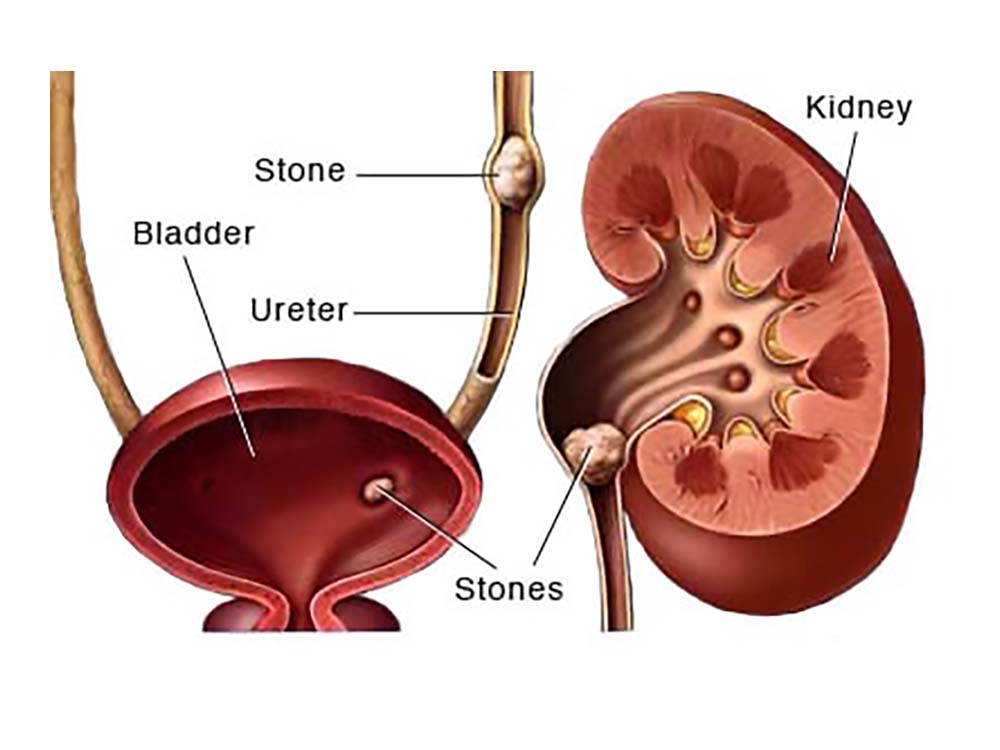Kidney Stones: Understanding, Prevention, and Homoeopathic Management
Introduction
Kidney stones, also known as renal calculi or urolithiasis, are hard mineral deposits that form within the kidneys. They can be painful and affect various parts of the urinary tract. This blog aims to provide a concise and easy-to-understand guide on kidney stones, including their causes, symptoms, prevention, and management.
What are Kidney Stones?
Kidney stones are hard mineral and salt deposits that develop in the kidneys or other parts of the urinary tract. They are formed when urine becomes concentrated, allowing minerals to crystallize and stick together.
Risk factors
- Diet: Certain foods high in oxalates, like spinach and nuts, can contribute to calcium oxalate stones.
- Excess body weight and obesity.
- Digestive diseases and surgery- Gastric bypass surgery, inflammatory bowel disease or chronic diarrhoea can cause changes in the digestive process that affect your absorption of calcium and water, increasing the amounts of stone-forming substances in urine.
- Other Medical conditions: Renal tubular acidosis, Cystinuria, Hyperparathyroidism and repeated urinary tract infections also can increase the risk of kidney stones.
- Medicinal causes-Certain medications and supplements, such as vitamin C, dietary supplements , calcium-based antacids, certain medications used to treat migraines or depression, can increase the risk of kidney stones.
Symptoms of Kidney Stones
- Sharp pain in the side and back, below the ribs.
- Pain radiating to the lower abdomen and groin.
- Pain in waves, fluctuating in intensity.
- Pain or burning sensation while urinating.
- Other signs include discolored urine, cloudy or foul-smelling urine, frequent urination, nausea, vomiting, fever, and chills.
When to Seek Medical Attention
If you experience severe pain, nausea, vomiting, fever, chills, blood in urine, or difficulty passing urine, seek immediate medical attention.
Preventive Measures
- Stay hydrated: Drink enough water throughout the day to produce sufficient urine (around 2 liters per day).
- Reduce oxalate-rich foods: Limit intake of foods like spinach, beets, chocolate, and tea, especially if you tend to form calcium oxalate stones.
- Limit salt and animal protein intake: Decrease salt consumption and opt for non-animal protein sources like legumes.
- Caution with calcium supplements: Consult your doctor before taking calcium supplements, as they may increase the risk of kidney stones.
Lifestyle Changes
- Maintain a balanced diet: Consult a dietitian to create an eating plan that reduces the risk of kidney stones.
- Exercise regularly: Physical activity can help with weight management and overall well-being.
- Avoid crash diets: Rapid weight loss may increase the risk of kidney stones.
HOMOEOPATHIC MANAGEMENT
Kidney stones can be a painful condition caused by mineral deposits in the urinary tract. While the small stones can managed with medication and increased water intake, severe situations may require surgical intervention. The advantage of homoeopathy on renal canculi over conventional medicine is we can prevent the tendency of stone formation by using constitutional medicines.
Homeopathy offers a range of remedies that may be helpful in managing kidney stones. Below are some common homeopathic medicines used for renal calculi, along with their indications:
- Medorrhinum: Renal (STONE) colic; with cold fingers; while coughing; with the craving of ice;
- Sarsaparilla: Passage of gravel or small calculi; RENAL colic; STONE in bladder; bloody urine. Urine: bright and clear but irritating; scanty, slimy, flaky, sandy, copious, passed without sensation; deposits white sand
- Nux-v: RENAL colic is caused by a STONE in the ureter, which by its irritation causes a spasmodic clutching of the circular fibers of that canal; the proper medicine relaxes these fibers and the pressure from behind forces the calculi out at once.
- Cantharis: Constant and intolerable urging to urinate before, during and after urination. Burning, scalding urine, with cutting, intolerable urging, and fearful tenesmus or dribbling stranguary. Urine is passed drop by drop. Intolerable urging with tenesmus. Urine scalds the passage. Jelly-like shreddy urine.
- Berberis vulgaris: Painful cuttings left side bladder into the urethra, comes from the left kidney (continued) along the course of the ureter. Blood-red urine, speedily becomes turbid, deposits thick, mealy, bright red sediment, slowly becoming clear, but always retaining its blood.
- Lycopodium clavatum: Lycopodium is beneficial for kidney stones on the right side, where the pain extends from the back to the lower abdomen. There may be frequent urination during the night, and the urine may have a sandy or red sediment.
- Calcarea carbonica: This remedy is suitable for individuals with a tendency to form kidney stones due to excess calcium in the urine. The person may experience pain in the kidneys and have a desire for cold drinks.
It’s important to remember that homeopathy is highly individualized, and the selection of the most appropriate remedy depends on a person’s unique symptoms and constitution. A qualified homeopathic practitioner will take a detailed case history to prescribe the most suitable remedy for each individual.
Note:As with any medical condition, always consult a healthcare professional for proper diagnosis and treatment, and do not self-medicate with homeopathic remedies.

